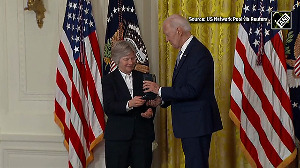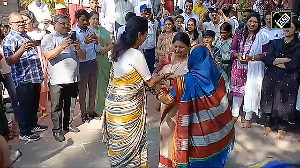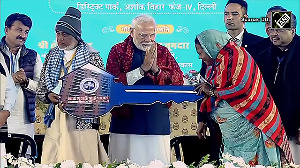 Tehseen Poonawalla, a gay rights and social activist, besides being a supporter of the Congress party, on Tuesday said that irrespective of the Supreme Court's ruling on Section 377 of the Indian Penal Code, which criminalises sexual activities "against the order of nature", arguably including homosexual acts, he would plead with the Apex court to legalise gay marriage.
Tehseen Poonawalla, a gay rights and social activist, besides being a supporter of the Congress party, on Tuesday said that irrespective of the Supreme Court's ruling on Section 377 of the Indian Penal Code, which criminalises sexual activities "against the order of nature", arguably including homosexual acts, he would plead with the Apex court to legalise gay marriage.
Poonawalla, who recently filed a writ petition against the Juvenile Justice Act which Parliament passed last December, wrote on his Facebook page: "I really hope the highest court of our land does justice to those who have a different sexual orientation. However, either way that the curative petition goes, I will be pleading before the court to legalise gay marriage. If #377 is struck down, it makes my task easier, if it is not, I will try finding a way around this inhuman law, through my petition."
He further wrote: "I have a solid legal strategy, and I want to fight this battle for justice. I hope to file my petition within a week of the judgment (whatever it may be on Section 377), and I am confident justice will be served. Even if 377 is not struck down, I will go before the courts to allow same sex marriage."
On Tuesday, the Supreme Court is expected to conduct an open court sitting on a curative petition filed by gay rights activists challenging its verdict on "criminalising homosexuality" in the country.
A Supreme Court bench headed by the Chief Justice of India Justice T S Thakur had earlier agreed to hear the curative petition against the Apex court's December 2013 judgment upholding the validity of Section 377 of the Indian Penal Code, which criminalises sexual activities against the order of nature, arguably including the homosexual acts, and a January 2014 order by which it had dismissed a bunch of review petitions.
The petitioners include the NGO Naz Foundation, working for the Lesbian, Gay, Bisexual, and Transgender community.
The plea states that the judgment was reserved on March 27, 2012, but a verdict was delivered after around 21 months. During this period, lot of changes took place, including amendment in laws, which were not considered by the bench, which delivered the judgment.
Gay rights activists have said that thousands from the LGBT community have come out with their sexual identity during the past four years after the Delhi high court "decriminalised" gay sex in 2009, and they were now facing the threat of being prosecuted.
The LGBT community has expressed hope that the Supreme Court would protect and legalise their sexual rights.
"As a transgender person and activist, I along with many other of my brothers and sisters from the transgender and the LGBT community, repose our hope on the Apex court that they would defend and protect the Constitution and the fundamental rights of all citizens of India, not excluding us," LGBT activist Vyjayanti Vasanta Mogli told ANI.
"We plead to the court not to undo the good that has happened through NALSA versus union of India. The lives of many others are entwined and dependent on this judgement. We plead to the court to dispense justice," Mogli added.
Echoing similar sentiments, another LGBT activist Akai said they expect that there would be a positive verdict.
Akai expressed her disappointment over the fact that hardly few of the parliamentarians know about this issue.
"The parliamentarians are really uneducated and illiterates because they don't know about sex, gender and sexuality. Very few people like Arun Jaitley, P Chidambaram wanted to take this issue. My question is how many of the parliamentarians will know about this issue?" Akai asked.
The Supreme Court would hear, in an open court sitting, a curative petition filed by gay rights activists challenging its verdict "criminalising homosexuality" in the country.
A bench headed by Chief Justice of India T S Thakur had earlier agreed to hear the curative petition against the apex court's December 2013 judgement upholding validity of Section 377 of the Indian Penal Code (IPC), which criminalises sexual activities against the order of nature, arguably including the homosexual acts, and a January 2014 order by which it had dismissed a bunch of review petitions.
The petitioners include NGO Naz Foundation, which works for the LGBT community.
The plea stated that the judgement was reserved on March 27, 2012, but a verdict was delivered after around 21 months. During this period, lots of changes took place, including amendment in laws, which were not considered by the bench which delivered the judgement.
The gay rights activists had said thousands from the LGBT community became open about their sexual identity during the past four years after the Delhi High Court "decriminalised" gay sex in 2009, adding that they were now facing the threat of being prosecuted









 © 2025 Rediff.com -
© 2025 Rediff.com -